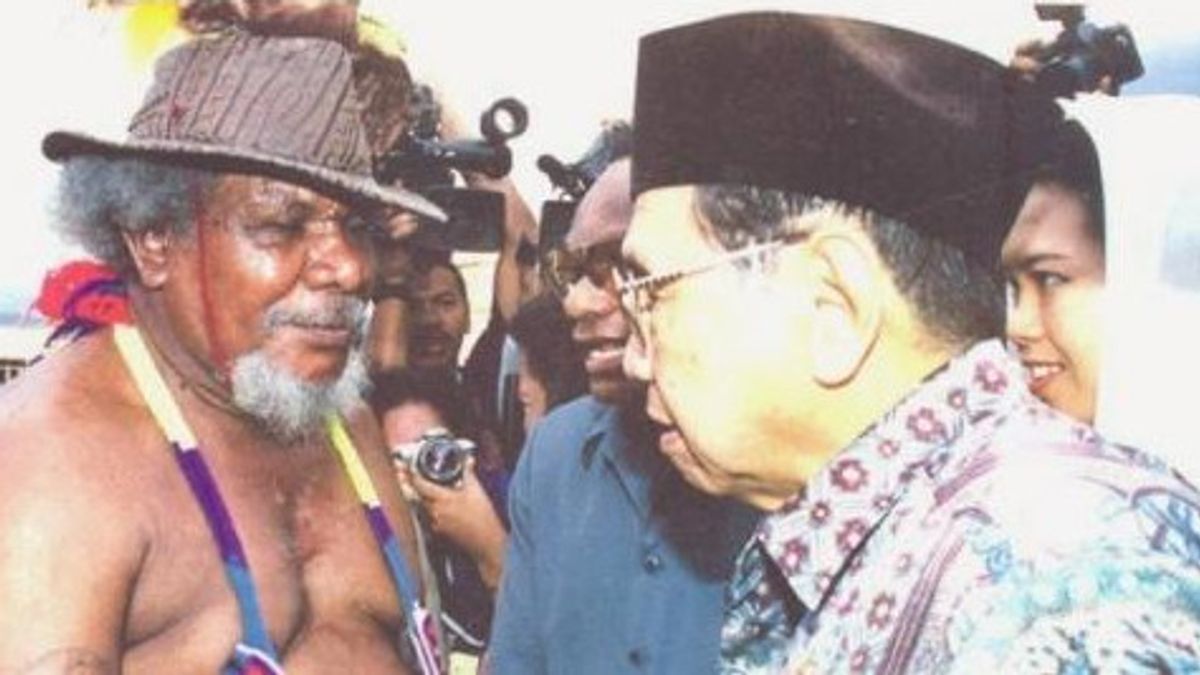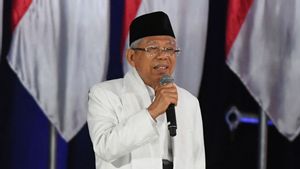JAKARTA - "Gitu aja kok repot (it's easy why bother?" A simple sentence, but is also very strong when juxtaposed with the world events. That sentence sticks to one person: Abdurrahman Wahid or Gus Dur. The fourth president of the Republic of Indonesia is also known as the Father of Indonesian Pluralism. Right, indeed. The world will be at ease if every human could live the Gus Dur saw the world.
Gus Dur would have been 80. He was good at seeing differences. But, he was also reliable in practicing the way of life in diversity.
Surya Adi Sahfutra explained the idea of pluralism in Gus Dur's head in 'Gus Dur's journal of Religious Pluralism Ideas for Equality and Harmony'. It was explained that Gus Dur emphasized pluralism in the view of openness to finding truth anywhere. That kind of view must be actualized in actions and thoughts. That's why Gus Dur was the most accepted president by various groups in Indonesia.
Gus Dur's way of establishing relationships with various groups, regardless of ethnic or religious exclusivism, was an extraordinary feature. Although known as a Muslim figure, Gus Dur was capable to be flexible. He could build social relationships with non-Muslim figures. He was friendly with many pastors, priests, various other religious figures, from Buddhism, Hinduism, and even Confucianism.
In Gus Dur's eyes, human relations are very important. He was a visionary who understands very well. The lines of distinction between religious and ethnic groups must be erased.
According to 'Discourse of Religious Pluralism, the Thought of Muslim and Christian Figures in Indonesia' by Zainul Fuad, it is explained how Gus Dur also frequently quoted verses from the Koran. Namely, surah al Hujarat verse 13: In fact, human differences are God's will to get to know each other.
With all these premises, Gus Dur was very sensitive to the fate of minorities. One of the minority groups who felt Gus Dur's justice was the Chinese group. Judging from the policies of the New Order, there was a comprehensive assimilation policy. At that time, President Soeharto stated that Indonesian citizens of Chinese descent must integrate and assimilate into Indonesian society.
Unfortunately, Suharto's practice was different from the theory. Assimilation often ran contrary. It even felt anti-assimilation in the policy implementation. Under Suharto, instead of assimilation, segregation was happening. This policy separated the groups into various communities.
The Chinese Lifes Has Changed
Pn January 17, 2000, Gus Dur revoked Presidential Instruction (Inpres) No. 14 of 1967 concerning China's Religion, Beliefs, and Customs. The Presidential Instruction ordered that the celebration of religious parties or ethnic Chinese customs be carried out in a family environment and not conspicuously in public.
After the Inpres was revoked, the Chinese could celebrate Chinese New Year in a lively and openly. Chinese New Year became a national holiday in 2003 under the administration of President Megawati Soekarnoputri.
When revoking the Inpres, Gus Dur emphasized that the Tioghoa ethnic group in Indonesia is part of Indonesia. Therefore, they also have the same rights as Indonesian citizens in general.
"They are Indonesians. They should not be isolated, only given one place. If someone criticizes them for not being active in society, it is because they didn't have the opportunity," said Gus Dur.
"The best way, our nation must open all doors of life for the Chinese people. So, they can be fully demanded to become Indonesians," he added.
Supports for Papua
Not only ethnic Chinese. Gus Dur also has his place in the hearts of the Papuan people. After 2 months and 10 days of his inaguration as president, Gus Dur visited Irian Jaya, which has now become Papua. At that time, Gus Dur was about to have a dialogue with the people of Irian Jaya.
Gus Dur accepted all of the people's complaints. Even the desire of the people of Irian Jaya to be independent of Indonesia. After this dialogue, Gus Dur finally returned the name Irian Jaya to Papua. During the New Order, the name Papua was taboo. It was synonymous with the Free Papua Organization (OPM) movement.
Gus Dur continued to provide support for the Papuan people. When the Papuan People's Congress II was protested, Gus Dur was at the forefront of supporting the event. Gus Dur even helped by providing funding assistance.
There was another unusual policy. Gus Dur allowed the Morning Star flag to be raised on the land of Papua. Although they can only be flown under the red and white flag, Gus Dur's policies remain controversial. For many people at that time, the Morning Star flag was a symbol of separatism. However, Gus Dur had another view. He firmly called the Morning Star flag a cultural symbol.
Quoted from Tirto, the General Chair of the Papuan Customary Council at that time, Forkorus Yaboisembut, said that Gus Dur was the only Indonesian president who openly recognized the Papuan people as a nation. "He opened and built democratic spaces, brought a sense of security and comfort. He also recognized the dignity and dignity of the Papuan people," said Forkorus, quoted the book that was edited by Irwan Suganda.
Gus Dur's short leadership, 22 months, has had a major impact on ethnic Chinese and Papuan society to this day. Gus Dur implemented Islamic teachings by prioritizing dignity, equality of human status before the law, and solidarity between human beings.
Not just for minorities. Gus Dur gave a lesson for all democratic societies. Democracy is a supporting pillar that provides equal rights for every human being.
The English, Chinese, Japanese, Arabic, and French versions are automatically generated by the AI. So there may still be inaccuracies in translating, please always see Indonesian as our main language. (system supported by DigitalSiber.id)










